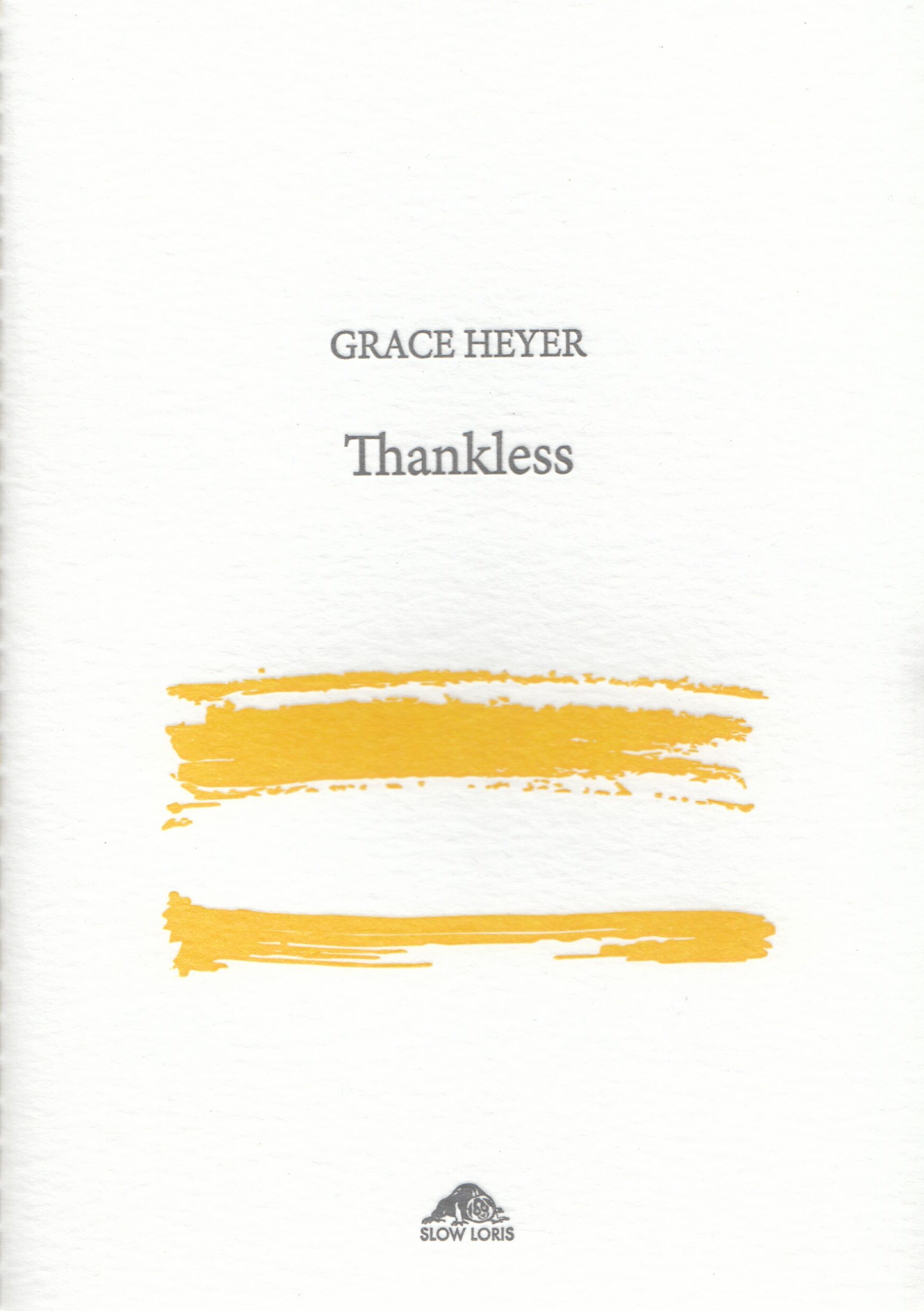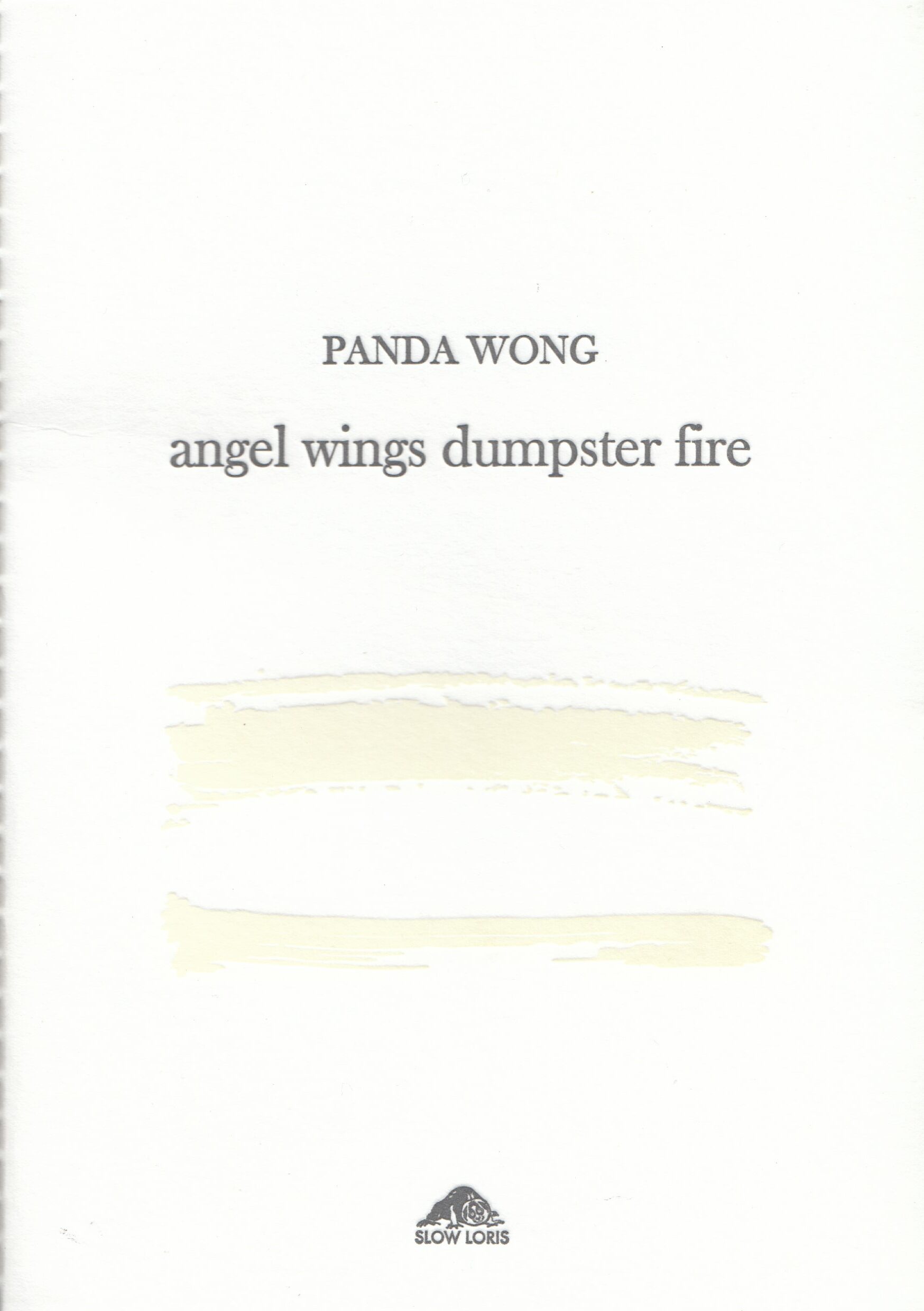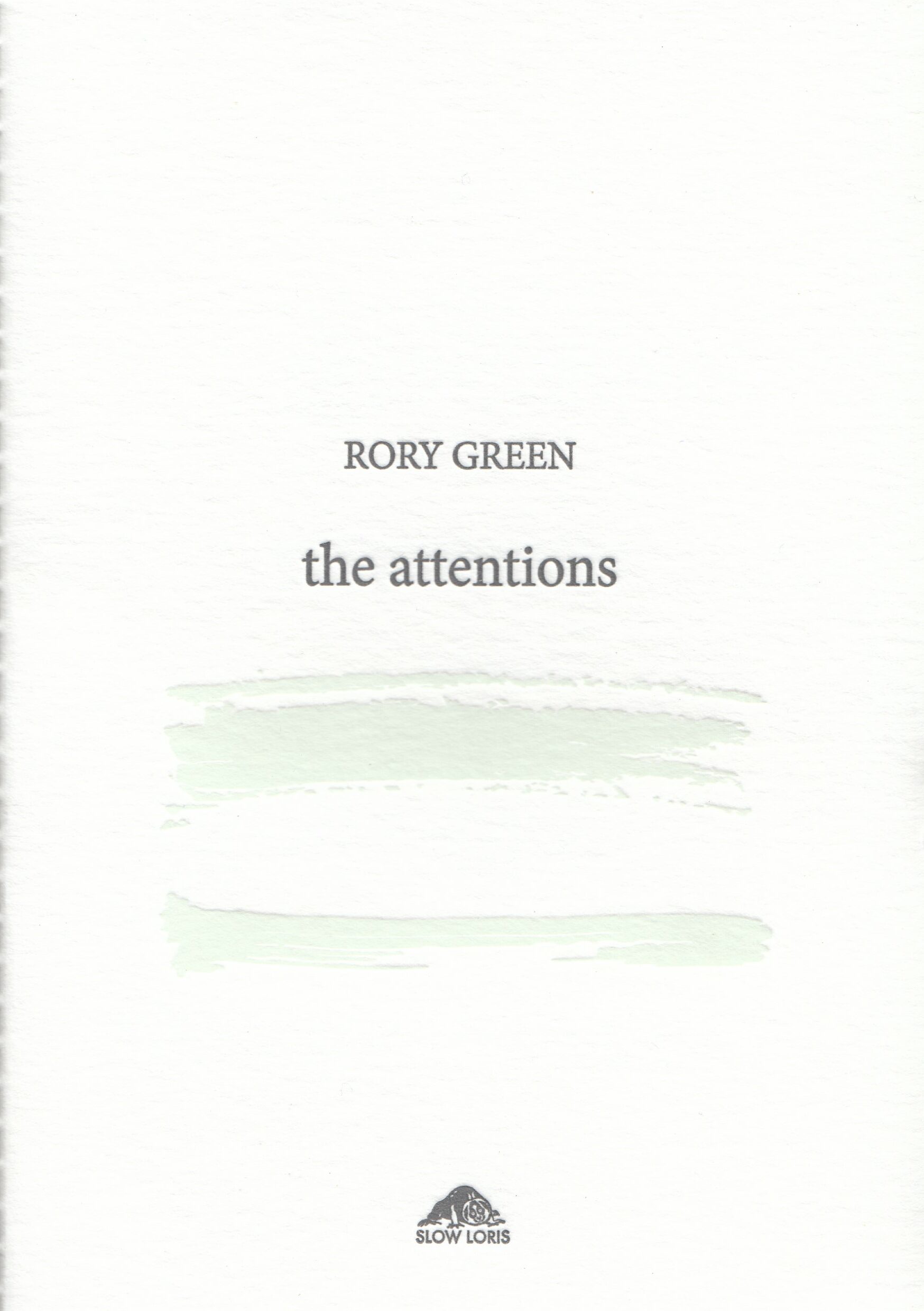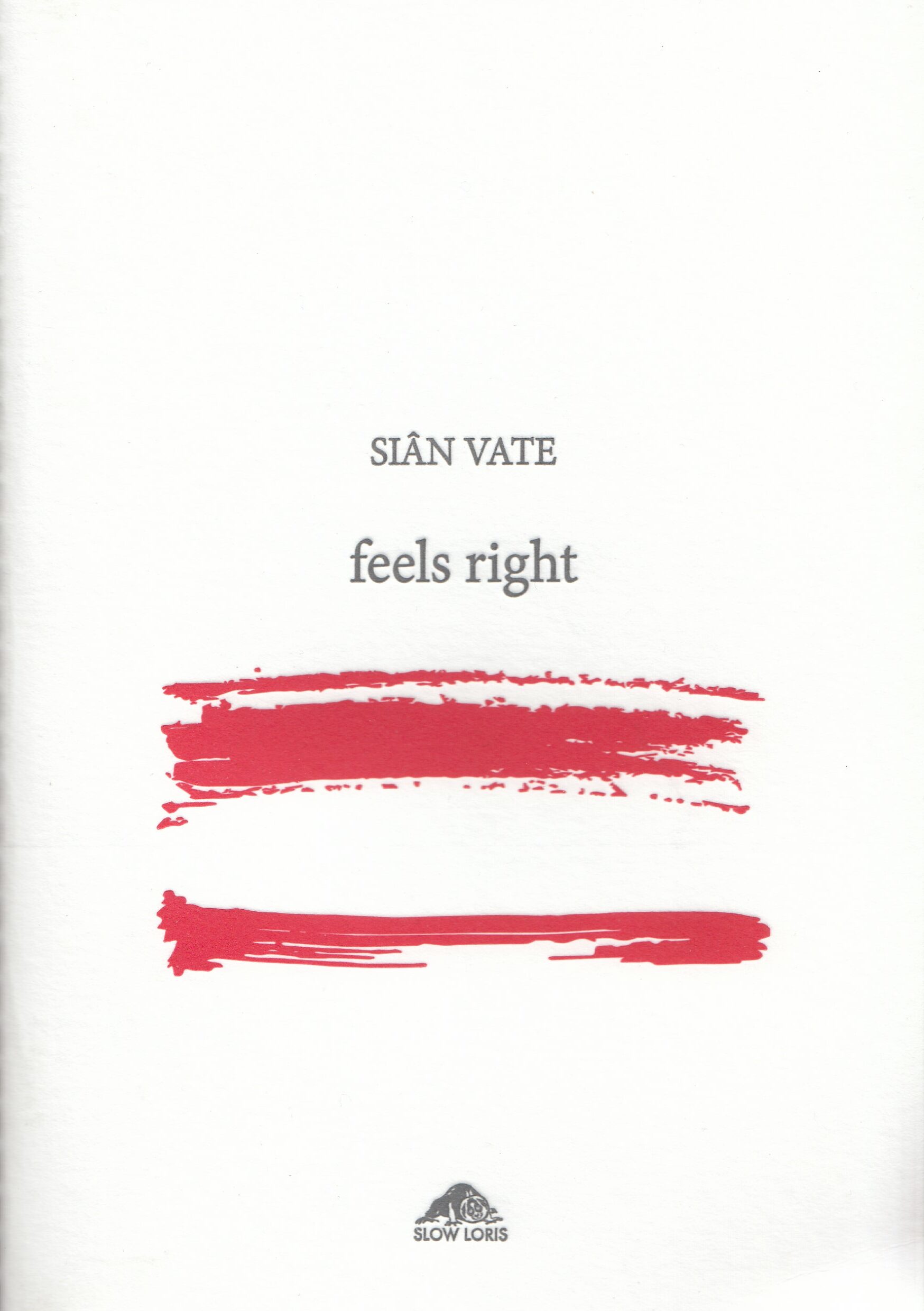
 Slow Loris Series 4
Slow Loris Series 4
Puncher & Wattmann, 2021
Thankless by Grace Heyer
angel wings dumpster fire by Panda Wong
the attentions by Rory Green
feels right by Siân Vate


Slow Loris Series 1 slouched onto the scene back in 2018, as a Puncher & Wattmann chapbook series edited by then Newcastle-based (now Bega-based) poet Chris Brown. Akin somewhat to the EP, the slew of titles now accruing on the website remind me of browsing through record bins as an adolescent: Daniel Swain’s You Deserve Every Happiness, But I Deserve More (Series 2, 2019) or Duncan Hose’s Testicles Gone Walkabout (Series 3, 2020) give an indication of the pith and pitch of this welterweight form. Distinctive in design, with splashes of colour across textured cardboard and a saddle stitch spine, Slow Lorii (plural?) retain something retro about them. Next to earn their stripes for Series 5, due later this year, are: Will Druce, Amelia Zhou, D Perez-McVie, Ella O’Keefe, and Louis Klee.
Grace Heyer, Thankless
Grace Heyer was a joint winner (with Ella O’Keefe) of the 2018 David Harold Tribe Poetry Award – a significant achievement for an emerging writer. Ella O’Keefe (who has lived in both Sydney and Melbourne) has always struck me as more of a cosmopolitan, than metropolitan poet, with her phenomenological mobility. Grace Heyer’s biography remains enigmatic; she is a “poet from rural New South Wales” who “lives with her two daughters and a growing number of cats” (back cover). In many ways Heyer is the more post-confessional poet, while coming to us from an unknown, possibly pastoral, locale. Yet, continuing the seemingly endless iterations of ‘city poet’ Frank O’Hara in Australian poetry, she writes:
I think I’ll be happy if I read O’Hara’s anti love poems because the baby is asleep and I want to drink and write and be uselessly sublime (8)
Heyer’s voice has the feminist grist of a Barbara Baynton protagonist, a young mother and baby in ‘the bush’ (reading Bukowski).
[…] love lets no one sleep in if it can help it—mewling through the flyscreen before it’s properly dark shit to do first thing and the heart won’t build itself (9)
There’s a domestic, rather than eco-, ‘sublime’ to Heyer’s poetic that alludes to past traumascapes, family fractures, alcoholism, births, deaths, and recurring biblical metaphors: “poet is the air inside the O word / from the rib of another” (3). The title, Thankless, seems in direct reference to women’s work. Heyer’s precision with phrasing reminds me of Kerri Shying’s Elevensies from Series 1, and both poets regionalise O’Hara’s ‘go on your nerve’ poetics, with this line from Heyer encapsulating her particular edge-play with the everyday:
Yours said I didn’t need another cigarette and made me a toasted sandwich (11)
Heyer dispenses with poem titles and instead bolds the first line of each poem, which has a somewhat similar effect to Shying’s use of the middle line as the title in the elevensies form. Both Shying and Heyer play with vernacular elliptically, a way of using direct language indirectly. Needless to say, writing from a regional area is no impediment to urbanity, to inventive use of punctuation and form, and to writing female experience. The second person address is used often in Thankless, and it can be hard to decipher if the poems are directed at a lover, a mother, a sister, or the self – which makes the collection flow like a guttural genealogy.
Panda Wong, angel wings dumpster fire
Written in pandemic-infused 2021, Panda Wong’s angel wings dumpster fire is a paternal elegy, presented as a blistering post-script to the eulogy she read at her father’s funeral four year’s prior, when: “my demeanour was sentimental. my energy was goblin” (10).
Part poetic personal essay, Wong considers death in the contemporary mediascape, where funerals are crowdfunded, held over Zoom, and an “AI start-up is recreating dead loved ones as chatbots” (6). Her references are a pastiche of the pop cultural: the Kardashians to Rebel Wilson through to the auteurism of Sophie Calle and Apichatpong Weerasethakul. The notes that follow the poems also reflect a metonymy of sources: citing news websites about people finding late loved ones on Google Maps alongside Lauren Berlant and Kathleen Stewart. Wong operates like a rag-picker, a restless spirit fossicking through materiality and immateriality, chimney sweeping ash from the internet as a form of ritual burn.
This is transgeneric poetry, delivered with rapid fire urgency and an intermingling of ways of knowing (scientific and poetic). The intergenerational is important here; the experience of witness and following how far vectors of transmutation might travel. The Bee Gees are Wong’s soundtrack to her father’s death. For me and my mother, it was Air Supply. With distance comes the aftereffect of memory and “the desire to see you blossoms in my gut like a gastrointestinal orchid” – which goes to prove that perhaps you can make a purse from a sow’s ear (12). Wong’s syncopated style reminds me of Jamie Marina Lau’s microfiction:
[…] the Chinese shop on Russell Street that always has a row of maneki neko in the window. their waving arms are never in synch. (17)
Wong does something zine-like with her chapbook and creates an artefact. She includes personal photographic snapshots of her father, as well as her father and mother, which create the analogue intimacy of a memorial pamphlet (without the generic funeral home language). It’s a performance of form which incites ritual: “this poem is for you. I’ll burn it too…” and “I live on in the dregs of your afterglow” (17; 20). The spectacle of the internet, “people putting different precious items in industrial blenders,” is considered alongside Mallarmé: where grief “without a shape to take, it leaks everywhere” (20; 20).









